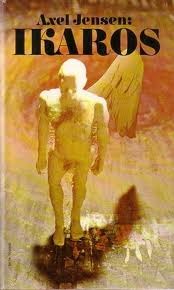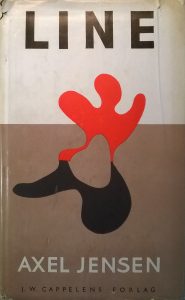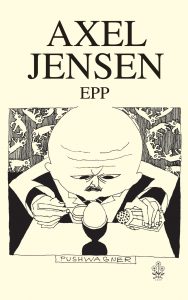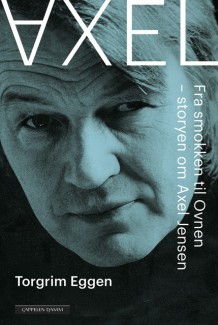(THIS ARTICLE IS MACHINE TRANSLATED by Google from Norwegian)
Axel Jensen's life was an adventurous life: His heaven and hell, drunkenness and ecstasy, anxiety and arrogance are hard to bring to one formula. Torgrim Eggen has in a reading party of a biography balanced on the tight line between life and works and tried to penetrate through the author's self-mythologizing. The title of the biography is taken from Lul: "The genes you have to stress with your whole life, from the tuxedo to the stove." For: "The hair, the skin, the chop, the whole bump is controlled by them."
There are studies of Axel Jensen's writing that plow deeper than Eggen, such as Tom Eides Outsider positions (1991). And many of the funniest anecdotes are recounted in Jan Christian Mollestad's conversation book The wizard i Eel Spring (1993). But Egg needs behind the myths and distinguishes between fact and fiction without getting bored. He has found new interesting things in Jensen's leftover papers and interviewed family, friends and acquaintances. The result has become one page turner.
One solution to existential problems is to find a rhythm of life. If you do not
turns, you're out to drive.
The image formed by Axel Jensen is by no means merely sympathetic. Olav Angell called him in his memory words in Dagbladet for a "proper asshole". But he also admitted that Jensen "wrote better Norwegian than us other writers, although we would not admit it".
Eggen made me read three of Jensen's novels again: Ikaros (1957) Line (1959) and Epp (1965). I skipped Joachim (1961) – up to date with Nick Broomfield's recent film Marianne & Leonard: Words of Love.
The egg penetrates behind the myths and distinguishes between fact and fiction without becoming boring.
Ikaros describes the escape, to throw as far away geographically and psychologically as possible from Norway. Line describes the way back – with a homecoming without reconciliation. But this is the science fiction novel Epp which governs later authorship: Lul (1992) and And the rest is written in the stars (1995). Why did Jensen end up with the perspective from Epp?
Ikaros – the escape
 "Anarchy is just immaturity. Socialism and scams. Communism a deception. Capitalism is an outgrowth on Earth's buttocks and as such disgusting. The welfare state a ridiculous mistake and all religion blasphemous. ”
"Anarchy is just immaturity. Socialism and scams. Communism a deception. Capitalism is an outgrowth on Earth's buttocks and as such disgusting. The welfare state a ridiculous mistake and all religion blasphemous. ”
Nothing makes life meaningful. The protagonist rejects everything. What he seeks out, "the wonderful, the impossible, the insane," is as imprecise as the notion of what he is fleeing from is stereotypical: "I wanted a little arm punch on earth. But who cares about a human warrior who wants a little arm punch in a world of robots? ” He is an outcast who "travels around the planet to find something that can fill the emptiness and loneliness we feel inside us." The protagonist has "rejected all conventions and approved life terms as false and useless". Nothing less. For he is "tired of mankind" and "finished civilization".
In the end, the protagonist, aka Ikaros, has rejected the sky. But it is still unclear where the road is going. The solution is no safer economy, deeper armchairs, "less work week, blue skies and bigger quinole retreats". And the meaning of life is also not to be found in sages far in the Sahara desert. "The hope is to find in the marvelous soil that gives rise to the flower of consciousness." Thus, a middle ground between heavenly idealism and silly materialism. How "the flower of consciousness" should sprout in the next novel was impossible to predict.
Line - Homecoming
 But the continuity is there: The protagonist of Line wearing a scarab from Tunis on the chest. It has the inscription "The Door to the Light". Utopia from Ikaros is still not stated completely.
But the continuity is there: The protagonist of Line wearing a scarab from Tunis on the chest. It has the inscription "The Door to the Light". Utopia from Ikaros is still not stated completely.
After many entanglements and a violent break with Line, Jacob is visited by Aunt Signe. He lies and says that a friend in the photography industry has promised him a job:
"She got a little softer in her voice. It was good to hear then, she said. So you finally plan to adapt now and become like the rest of us? Yes, that was nice, Jacob. "
But Jacob does not believe in adaptation: "By the way, who is who to whom? And when everyone is so eager to adapt to each other, what will be the result? Only bigger death letters in the newspapers. More silverware to polish. ”
The novel ends with him going to the Theater Café and meeting Wanja, the Hittite girl, "the daughter of the night". The door of the light is closing.
Epp - The absurdity of A4 life
 The dystopian satirical novel Epp describes an adaptation that is carried out entirely in the grotesque. Instead of brushing silverware, Epp specializes in boiling the egg in a pedantic way that makes this the centerpiece of life. He has worked inside the apartment with the carnivorous plant, produces almond crack and studies the wallpaper with five dogs biting each other in the tail until he comes into ecstasy. And when he comes out of his little bubble, he faints in agony. The portrait of Epp hits us all at our most square, pedantic and intolerant.
The dystopian satirical novel Epp describes an adaptation that is carried out entirely in the grotesque. Instead of brushing silverware, Epp specializes in boiling the egg in a pedantic way that makes this the centerpiece of life. He has worked inside the apartment with the carnivorous plant, produces almond crack and studies the wallpaper with five dogs biting each other in the tail until he comes into ecstasy. And when he comes out of his little bubble, he faints in agony. The portrait of Epp hits us all at our most square, pedantic and intolerant.
Epp's world is the horizon Jensen continues to dictate. He creates an image of normalcy. The fit is boring, it's the box, the A4 life brought to the extreme. Biographically, this development runs in parallel with intoxication experiments, LSD, and not least a formidable writing barrier after 1965.
A labile synthesis
Found Axel Jensen one modus vivendi between the "robot" existence and the longing for the wonderful and impossible? In life he chose to live on the border. At the end of a boat, where he could – at least in theory – at any time throw away. And even though the disease ALS forced him ashore, he still kept in mind: He got published an awful lot as bedridden.
Jensen was a jazz-inspired language artist more than a philosopher. Torgrim Eggen writes: "The way Frank Sinatra developed a singing style by listening to saxophonists and trumpet players, this is how Axel Jensen developed his literary language, with syncopes, rhythmic repetitions, long and virtuosic phrases alternating with short shocks. No wonder Axel became addicted to reading what he wrote out loud to people before giving it its final shape. ”
One solution to existential problems is to find a rhythm of life. If you don't swing, you're out driving. Axel Jensen swung.
If not always in life, then at least in literature.






